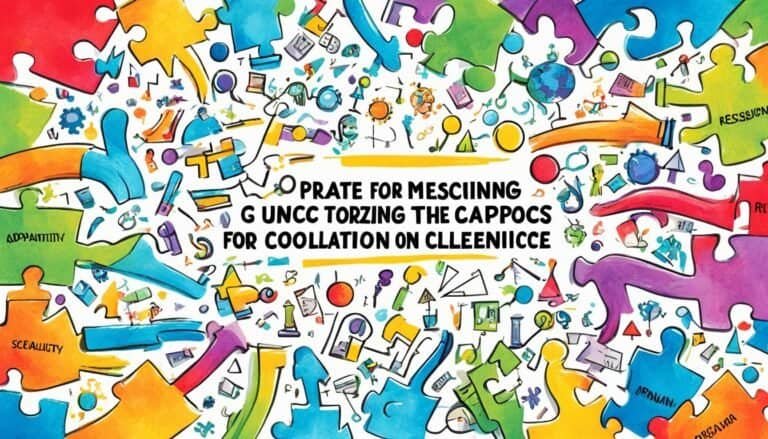Essential Insights: Lessons from Rollo May
“The opposite of courage in our society is not cowardice, it’s conformity.”
Rollo May, a prominent figure in existential psychology and humanistic psychology, imparted invaluable wisdom through his teachings and writings. His philosophy centered around personal growth, meaning, and freedom, inspiring individuals to embrace their authentic selves and break free from societal norms. From his profound quotes to his groundbreaking books, Rollo May’s psychological insights continue to resonate with people today, challenging us to question conventional beliefs and embark on a journey of self-discovery and self-fulfillment.
Key Takeaways:
- Rollo May was a leading figure in existential psychology and humanistic psychology.
- His philosophy emphasized personal growth, meaning, and freedom.
- Rollo May’s teachings encourage individuals to break free from societal conformity and embrace their authentic selves.
- Through his profound quotes and writings, Rollo May provokes thought and encourages self-discovery.
- His psychological insights continue to have a profound impact on individuals seeking personal fulfillment.
Rollo May’s Existential Psychology
Rollo May, a prominent figure in the field of existential psychology, developed his approach based on the principles of existentialism and humanistic psychology. His work focused on understanding the human experience and the pursuit of personal growth.
In May’s existential psychology, he emphasized the concept of essential freedom, which involves the individual’s capacity to pause and consciously choose their response to life’s circumstances. This pause allows individuals to attain a sense of self-liberation and empowers them to make intentional choices that align with their values and goals.
May believed that this essential freedom is a fundamental aspect of the human experience and plays a vital role in personal growth and fulfillment. It is through the practice of the pause that individuals can gain a deeper understanding of themselves, their desires, and their purpose. By taking the time to reflect and deliberate, individuals can make more authentic and meaningful decisions in their lives.
May’s teachings on existential psychology have had a profound impact on how we perceive human behavior and the importance of individual agency. His insights provide valuable guidance on self-discovery and the pursuit of personal freedom.
The Connection Between Freedom and Destiny
In his exploration of existential psychology, Rollo May delved into the intricate relationship between freedom and destiny. According to May, individuals possess the remarkable power to shape their own lives through conscious choice and responsibility, thereby influencing their own destinies. This concept emphasizes the importance of self-creation and the fulfillment of individual potential through intentional actions and decisions.
May’s teachings underscore the significance of recognizing the freedom that exists within each person’s life. By embracing this freedom, individuals become aware of their ability to make conscious choices and take responsibility for the outcomes they create. This sense of autonomy allows them to actively shape their destinies and lead lives of purpose and meaning.
“Responsibility is the ability to respond creatively to the challenges of life.”
May’s philosophy highlights the transformative power of self-creation. He believed that by consciously choosing their actions, thoughts, and beliefs, individuals can actively shape their own identity and create the life they desire. This process of self-creation involves self-awareness, reflection, and an understanding of one’s individual potential.
By recognizing their freedom and responsibility, individuals can tap into their unique capabilities and chart a course that aligns with their values and aspirations. May’s insights empower individuals to navigate the complexities of life with a sense of purpose and agency.
Unlocking Individual Potential
May’s teachings also emphasize the importance of recognizing and unlocking individual potential. He believed that each person possesses inherent talents, abilities, and capacities that, when nurtured and developed, can contribute to personal growth and a fulfilling life.
Through conscious choice and responsible action, individuals can tap into their inherent potential and cultivate a life that aligns with their true selves. This requires introspection, self-reflection, and a willingness to challenge self-imposed limitations.
“People are not prisoners of fate, but only prisoners of their own minds.”
May encourages individuals to overcome fear and embrace the freedom to pursue their passions and aspirations. By making conscious choices and taking calculated risks, individuals can navigate their journey towards self-fulfillment and personal actualization.
The Path to Conscious Choice
Conscious choice is a central theme in May’s philosophy. It involves acknowledging the freedom to determine one’s own actions and the subsequent responsibility that comes with it. By making decisions based on personal values, beliefs, and goals, individuals can create a life that is authentic and aligned with their true selves.
This conscious decision-making process requires self-awareness, self-reflection, and a willingness to confront discomfort and uncertainty. Through this intentional inner work, individuals can gain clarity about their desires and motivations, paving the way for informed choices that lead to personal growth and fulfillment.
“Freedom is the capacity to pause in the face of stimuli from many directions at once and, in this pause, to throw one’s weight toward this response rather than that one.”
May’s teachings compel individuals to embrace their freedom, recognize their responsibility, and consciously choose their path. By doing so, individuals can unlock their full potential, shape their own destinies, and live lives of purpose and meaning.
| Key Ideas | Key Terms |
|---|---|
| Freedom and destiny are intertwined, allowing individuals to shape their own lives. | Freedom and destiny |
| Conscious choice and responsibility are essential in self-creation and personal growth. | Conscious choice, responsibility, self-creation |
| Individual potential can be unlocked through self-awareness and intentional actions. | Individual potential, self-awareness, intentional actions |
The Significance of Despair in Personal Growth
Despair, often associated with negative connotations, holds a profound transformative role in personal growth. Rollo May, the influential existential psychologist, argued that confronting and examining despair can lead to invaluable insight, awareness, and personal fulfillment. By embracing the concept of “constructive despair,” individuals can navigate the complexities of life, finding meaning and joy amidst the challenges they face.
May encouraged self-reflection as a powerful tool for navigating through despair. Through introspection and deep self-examination, individuals can gain a clearer understanding of their emotions, thoughts, and values. Self-reflection allows for a deeper level of introspection, helping individuals to make sense of their experiences and find meaning in the face of despair.
“Despair is the price one pays for self-awareness. Look deeply into life, and you’ll always find despair.” – Rollo May
Constructive despair pushes individuals to introspect, question, and re-evaluate their lives, ultimately leading to personal growth and self-discovery. It serves as a catalyst for change, prompting individuals to examine their belief systems, values, and goals, and make necessary adjustments. By embracing the discomfort that despair brings, individuals can find the motivation to break free from old patterns and create a life aligned with their true values and aspirations.
The Transformative Power of Despair
Despair is not meant to be a permanent state of being; rather, it is a temporary phase that propels individuals towards growth. By embracing the emotions and challenges that arise from despair, individuals can embark on a journey of self-transformation.
Self-reflection plays a significant role in this process. It allows individuals to explore their inner world, identify areas that require attention, and make conscious choices to navigate towards a more fulfilling life. Through self-reflection, individuals gain a deeper understanding of themselves, their desires, and their purpose, paving the way for personal growth and joy.
Despair acts as a catalyst for change, prompting individuals to re-evaluate their priorities and make meaningful adjustments. It pushes people to question their current circumstances and seek paths that align with their authentic selves. In the face of despair, individuals often discover newfound strength, resilience, and a renewed sense of purpose.
Constructive despair, when channeled into self-reflection and intentional action, opens doors to personal growth and self-empowerment. As Rollo May aptly explained, “Despair is the price one pays for self-awareness.” Through this transformative process, individuals gain a deeper understanding of themselves, discovering their true potential and finding joy even amidst the most challenging circumstances.
The Importance of Pause and Reflection
In the realm of self-awareness and personal growth, Rollo May emphasized the significance of pause and reflection. Taking the time to step back and contemplate our thoughts, choices, and actions can have a profound impact on our journey towards freedom and meaningful living.
Pause and reflection enable us to gain a deeper understanding of ourselves and the world around us. By intentionally creating moments of quiet contemplation, we develop self-awareness and a clearer sense of our values and goals. This self-awareness empowers us to make choices that align with our authenticity, paving the way for a more fulfilling life.
*”It is only in the pause that we can truly exercise our freedom of choice. By reflecting on our thoughts and actions, we cultivate the ability to consciously choose our response in any given situation.”* – Rollo May
Through the practice of pause and reflection, we liberate ourselves from the autopilot mode and embrace the power of conscious choice. A pause allows us to break free from habitual patterns and consider alternative perspectives, opening up new possibilities and avenues for growth.
It is in these moments of self-reflection that we gain clarity about what truly matters to us. By examining our thoughts and values, we can make decisions that align with our deepest aspirations and values. This intentional alignment of our choices with our innermost desires brings about a sense of purpose and meaning.
Benefits of Pause and Reflection
By incorporating pause and reflection into our daily lives, we can experience a myriad of benefits:
- Increase in self-awareness and understanding
- Enhanced decision-making abilities
- Connection with our authentic selves
- Clarity about personal values and goals
- Greater alignment between actions and aspirations
- Reduced stress and anxiety
- Heightened sense of purpose and fulfillment
Through deliberate moments of pause and reflection, we empower ourselves to become architects of our own lives. By consciously examining our choices and actions, we navigate towards a path that resonates with our true selves and leads to a life of greater freedom and fulfillment.
Implementing Pause and Reflection in Daily Life
Integrating pause and reflection into our daily routines doesn’t have to be complicated. Here are a few simple strategies:
- Start the day with a few moments of stillness and self-reflection.
- Set aside regular time for journaling, allowing thoughts and emotions to flow onto the page.
- Engage in mindfulness or meditation practices to cultivate present moment awareness.
- Take short breaks throughout the day for deep breathing and reflection.
- Carve out dedicated time for hobbies, creative pursuits, or activities that bring you joy and inspire reflection.
- Seek solitude in nature, immersing yourself in its beauty and finding space for inner contemplation.
- Engage in deep, meaningful conversations with trusted friends or mentors.
Remember, incorporating pause and reflection into our lives is a journey. It may take time and practice to develop this habit, but the rewards are immeasurable. By embracing these moments of introspection, we cultivate self-awareness, exercise our freedom of choice, and embark on a path of purpose and meaningful action.
| Benefits of Pause and Reflection |
|---|
| Increase in self-awareness and understanding |
| Enhanced decision-making abilities |
| Connection with our authentic selves |
| Clarity about personal values and goals |
| Greater alignment between actions and aspirations |
| Reduced stress and anxiety |
| Heightened sense of purpose and fulfillment |
Understanding the Human Experience
In his exploration of the human experience, Rollo May delved into the complexities of freedom, destiny, authenticity, anxiety, and death. He recognized that these fundamental aspects of our existence shape our journey towards personal growth and fulfillment.
May believed that freedom lies at the core of the human experience. It is the essential foundation upon which we build our lives and make meaningful choices that align with our values and desires. Through the lens of freedom, we are empowered to shape our own destinies and create a life of purpose.
The concept of authenticity also emerged as a significant theme in May’s teachings. He encouraged individuals to embrace their true selves, to be genuine and honest in their thoughts and actions. By embodying authenticity, we can cultivate a sense of self-awareness and live a life that is aligned with our deepest values.
Anxiety, according to May, is an inherent part of the human experience. It serves as a catalyst for personal growth and self-discovery. Rather than avoiding or suppressing anxiety, May advocated for embracing it as a source of transformation and exploration. By navigating our anxieties, we can uncover hidden aspects of ourselves and expand our understanding of who we truly are.
“The opposite of courage in our society is not cowardice, it’s conformity.” – Rollo May
Furthermore, May acknowledged the existential reality of death and its impact on our lives. He encouraged individuals to confront the concept of mortality and recognize its ability to infuse our lives with a sense of urgency and purpose. By embracing the finite nature of life, we can cultivate a deep appreciation for the present moment and live more fully.
The human experience, as explored by Rollo May, encompasses the multifaceted dimensions of freedom, destiny, authenticity, anxiety, and death. Understanding and embracing these aspects of our existence can lead us on a profound journey of self-discovery, personal growth, and meaningful fulfillment.
| Keywords | Definition |
|---|---|
| Human Experience | The collective encounters, emotions, and perceptions that shape an individual’s journey through life. |
| Freedom | The ability to make independent choices and act in accordance with one’s own will. |
| Destiny | The predetermined course of events in a person’s life, often believed to be guided by external forces. |
| Authenticity | The state of being true to oneself, genuine, and aligned with one’s core values and beliefs. |
| Anxiety | A feeling of unease or apprehension, often associated with uncertainty or fear of the unknown. |
| Death | The irreversible cessation of life, serving as a reminder of our mortality and the finite nature of existence. |
The Three Modes of Existence
Rollo May introduced the concept of the three modes of existence: Umwelt, Mitwelt, and Eigenwelt. These modes encompass different aspects of our lives and provide insight into our relationships with the world, others, and ourselves.
Umwelt: Objective Aspect of the Environment
In the Umwelt mode, we focus on the objective aspects of our internal and external environment. It encompasses our physical surroundings, senses, and interactions with the world. It includes our experience of nature, the sensory input we receive, and our responses to it. Umwelt represents the external factors that shape our perception and understanding of the world around us.
Alienation from the Umwelt mode can result in a disconnection from the physical environment and a diminished appreciation for the sensory experiences that enrich our lives. It can lead to feelings of detachment and an inability to fully engage with the world.
Mitwelt: Social Relationships
Mitwelt refers to the mode of existence that involves our social relationships with others. It encompasses the connections we form, the communities we are a part of, and the bonds we develop. Mitwelt encompasses our interactions, communication, and shared experiences with family, friends, colleagues, and society as a whole.
Meaningful relationships within the Mitwelt mode play a crucial role in our well-being and sense of belonging. They provide support, companionship, and a sense of identity. Alienation from the Mitwelt mode can lead to isolation, loneliness, and a lack of meaningful connections.
Eigenwelt: Relationship with Oneself
Eigenwelt represents the mode of existence that focuses on our relationship with ourselves. It encompasses self-awareness, introspection, and our understanding of our own thoughts, emotions, and beliefs. Eigenwelt reflects our inner world and the unique experiences, values, and aspirations that shape our identity.
Self-awareness and self-reflection within the Eigenwelt mode are essential for personal growth and a sense of authenticity. By cultivating this mode, we can better understand ourselves, acknowledge our strengths and weaknesses, and make choices that align with our values and aspirations.
“To be nobody-but-yourself in a world which is doing its best, night and day, to make you everybody but yourself means to fight the hardest battle which any human being can fight; and never stop fighting.” – Rollo May
By embracing all three modes of existence – Umwelt, Mitwelt, and Eigenwelt – we can cultivate a more holistic and meaningful approach to life. It is through the interplay of these modes that we can forge genuine connections, find purpose, and navigate the complexities of the human experience.
| Mode of Existence | Description | Alienation |
|---|---|---|
| Umwelt | Objective aspect of the environment | Detachment from the physical environment |
| Mitwelt | Social relationships | Isolation and lack of meaningful connections |
| Eigenwelt | Relationship with oneself | Lack of self-awareness and authenticity |
The three modes of existence offer insight into the complexities of our human experience. By nurturing meaningful relationships, being present in the world around us, and cultivating self-awareness, we can find a sense of purpose, fulfillment, and meaningful connections.
Freedom, Consciousness, and Anxiety
In his exploration of the human experience, Rollo May delved into the intricate relationship between freedom, consciousness, and anxiety. According to May, freedom is not merely an abstract concept but is deeply intertwined with consciousness and the ability to make conscious choices that align with one’s authentic values and goals.
May acknowledged that anxiety is an inevitable part of the human condition, a response to the uncertainties and challenges of life. However, he believed that embracing freedom and conscious choice can empower individuals to navigate and conquer anxiety, leading to personal growth and fulfillment.
“Anxiety is the dizziness of freedom.”
May highlighted the significance of authenticity, the cornerstone of conscious choice. By embracing one’s authentic self and aligning actions with deeply held values, individuals can break free from the confines of societal expectations and experience a sense of empowerment and freedom.
The journey towards conscious choice and authentic living requires self-awareness and introspection. May encouraged individuals to pause and reflect, examining their thoughts, emotions, and motivations. This self-reflection is a crucial step towards gaining a deeper understanding of oneself and making more intentional and meaningful choices.
Integrating freedom, consciousness, and anxiety allows individuals to embrace their personal power and take responsibility for their own lives. By consciously choosing their path and aligning their actions with their authentic values, individuals can cultivate a sense of purpose and meaning.
The Relationship Between Consciousness and Freedom
May’s perspective on consciousness and freedom emphasizes the importance of self-awareness in the pursuit of freedom. By cultivating consciousness, individuals become more attuned to their authentic desires and motivations, allowing them to exercise their freedom in a conscious and intentional manner.
Overcoming Anxiety Through Conscious Choice
The journey towards embracing freedom and conscious choice is not without its challenges. May acknowledged that anxiety can often act as a barrier to embracing freedom. However, by making conscious choices that align with one’s authentic values, individuals can confront and overcome anxiety, ultimately achieving a greater sense of freedom and personal growth.
The Essence of Authenticity in Freedom
Authenticity plays a crucial role in the pursuit of freedom. Living authentically involves embracing one’s true self and aligning actions with individual values and beliefs. By embracing authenticity, individuals can break free from external pressures and expectations, choosing a path that is true to themselves and fostering a deep sense of freedom and fulfillment.
The Power of Pause and Reflection
In the face of the complexities of life, pause and reflection provide individuals with the space and time to make conscious choices. Taking a moment to reflect on one’s thoughts, emotions, and motivations allows for a more deliberate and meaningful decision-making process. Through pause and reflection, individuals can exercise their freedom and make choices that align with their authentic selves.
Embracing Freedom, Conquering Anxiety
May’s teachings remind us that freedom and anxiety are intrinsically linked. By embracing freedom through conscious choice and cultivating self-awareness, individuals can navigate and conquer anxiety, leading to personal growth, fulfillment, and the discovery of their true potential.
Conclusion
Rollo May’s teachings and insights in existential psychology have had a profound impact on personal growth and our understanding of the human experience. Through his exploration of concepts like freedom, consciousness, despair, and the significance of pause and reflection, May has inspired individuals to take responsibility for their lives and make conscious choices. He has shown us that by doing so, we can find greater meaning and fulfillment.
May’s emphasis on the importance of personal freedom encourages us to embrace our authentic selves and live intentional, purposeful lives. His teachings remind us that we have the power to shape our own destinies and create a life that aligns with our values and goals. By delving into existential psychology, May has given us the tools to navigate the complexities of our existence and find the true essence of who we are.
The lessons we can learn from Rollo May’s philosophy are timeless and continue to resonate with people today. His teachings guide us towards self-discovery, self-acceptance, and personal growth. As we embrace the principles of existential psychology, we gain a deeper understanding of ourselves and the world around us. May’s legacy reminds us that by seeking meaning, embracing freedom, and making conscious choices, we can lead a more fulfilling and purposeful life.
Source Links
- https://www.linkedin.com/pulse/examining-view-existentialism-rollo-may-bringing-out-its-uchendi-0mtyf
- https://socialsci.libretexts.org/Bookshelves/Psychology/Culture_and_Community/Personality_Theory_in_a_Cultural_Context_(Kelland)/09:_Viktor_Frankl_Rollo_May_and_Existential_Psychology/9.04:_Rollo_May_and_Existential_Psychology
- https://www.themarginalian.org/2017/10/04/rollo-may-freedom-destiny-pause/








